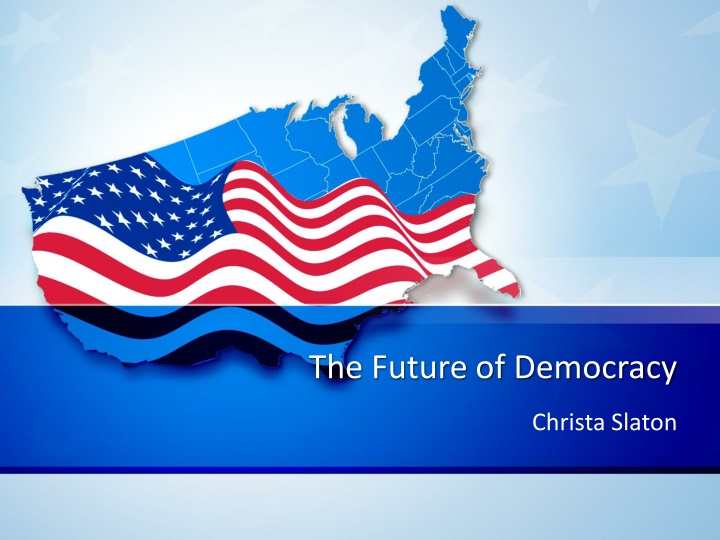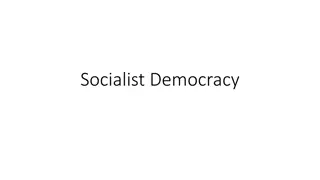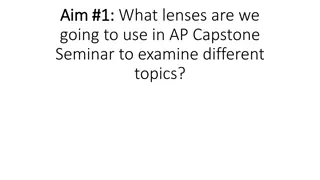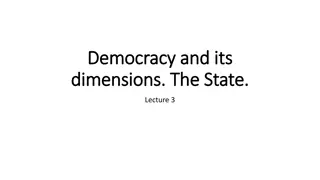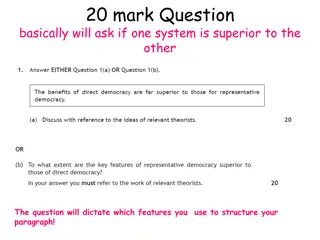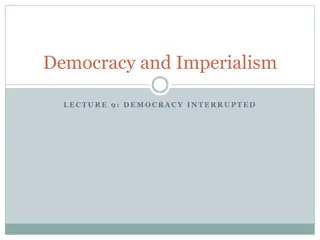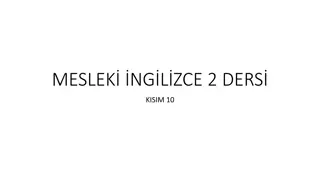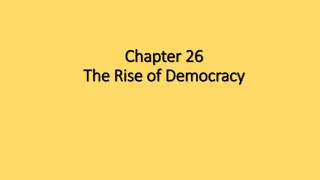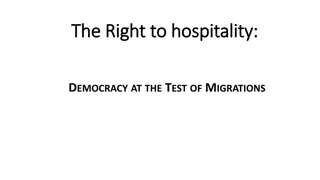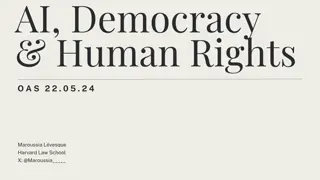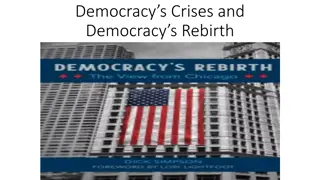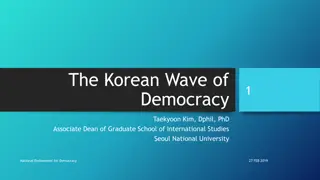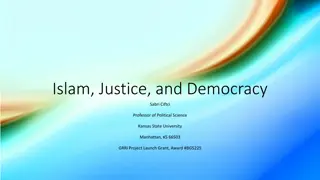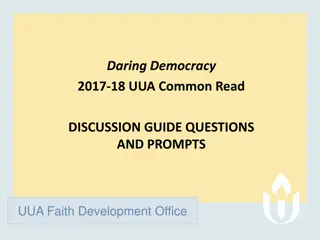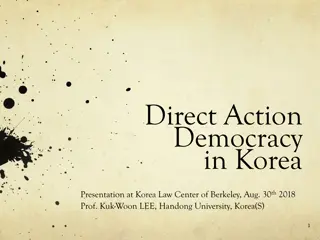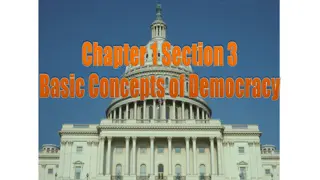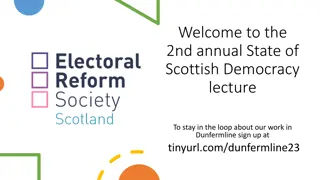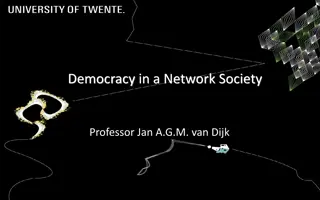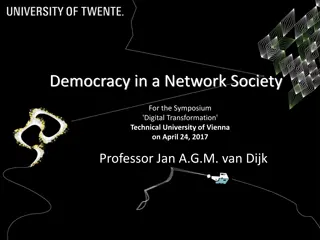The Complex History of American Democracy Through Visuals
Explore a collection of images depicting pivotal moments and challenges in American democracy, from historical events like the Civil War and Civil Rights Movement to modern-day issues such as voter suppression and conspiracy theories. Reflect on questions about the current state of democracy, polarization, and civil discourse, while also delving into the history of the Ku Klux Klan's influence on politics.
Download Presentation

Please find below an Image/Link to download the presentation.
The content on the website is provided AS IS for your information and personal use only. It may not be sold, licensed, or shared on other websites without obtaining consent from the author.If you encounter any issues during the download, it is possible that the publisher has removed the file from their server.
You are allowed to download the files provided on this website for personal or commercial use, subject to the condition that they are used lawfully. All files are the property of their respective owners.
The content on the website is provided AS IS for your information and personal use only. It may not be sold, licensed, or shared on other websites without obtaining consent from the author.
E N D
Presentation Transcript
The Future of Democracy Christa Slaton
Picture of Jan 6 Insurrection Black Lives Matter KKK Rally Me Too Protests Voter Suppression Laws/Long Voting Lines Conspiracy Theories Pedophilia Stolen 2020 Presidential election Covid 19 no worse than the flu
Questions to Consider: Are we living in the worst of times for American representative democracy? Why are we so polarized? Are we more adversarial than previous time in our history? Do we have the willingness and capacity to improve our civil discourse? If so, who will lead in this endeavor?
My perspective To be forthright at the outset One thing I believe profoundly: We make our own history. Eleanor Roosevelt
Are we living in the worst of times for American representative democracy? Slavery Civil War Assassination of 4 Presidents 1 President and 2 Presidential Candidates Shot Jim Crow Laws and Segregation Imprisonment of Suffragettes during WWI Civil Rights Movement Vietnam War Protests
Ku Klux KLan in 1920s By 1924, every state had a Klan presence. Indiana, Oregon, Colorado, and Kansas were strongholds. Unease about crime Worry about anarchists Fear of immigrants flooding in from Europe desolated by war Nativism was prevalent; the new Klansmen hated blacks, Catholics, and Jews alike.
Klansmen held 11 governorships, 16 U.S. Senate seats, and 75 seats in the House of Representatives. In Alabama, Hugo Black, a future justice of the U.S. Supreme Court, joined the Klan. Harry Truman nearly joined the Klan in 1922 when he was running for a judgeship in Missouri. He declined after he was told he would be expected to keep Roman Catholics our of county jobs.
1925 30,000 Klan members marched on Washington Mall. Some say it was a large as 50,000) They were dressed in full regalia
I agree with Jon Meacham Much of American story lies in the courage of the powerless to make the powerful take notice. Jon Meacham
Why are we so polarized? Negative campaigns Single Issue Politics Media Focus on the Conflicts & Personalities Disagreements Turn into Attacks on Character Identity Politics Fake News Highly Partisan Politics Voter Suppression Laws
Are we more adversarial than previous time in our history? Campaigns have always been nasty: 1804 Thomas Jefferson was accused of having children with his slave, Sally Heming 1824 John Quincy Adams was ridiculed for dressing poorly and having an English wife; Henry Clay was called a drunkard and gambler ; and Andrew Jackson was accused of murder 1876 Rutherford Hayes was accused of stealing pay of dead soldiers and shooting his mother in a fit of insanity; Samuel Tilden was called a drunkard, syphilitic, liar, and swindler
Are we more adversarial than previous time in our history? Disputes in the 18th and 19thCentury were resolved by dual: Alexander Hamilton killed in dual by Aaron Burr Violence, drunkenness and vote buying were a regular part of elections in the 19th and early 20thCentury Voter intimidation, beatings, and killings prevented African-Americans from voting in many Southern states
Do we have the willingness and capacity to improve our civil discourse? If so, who will lead in this endeavor? Reformers, Educators, Movements and Activists throughout Our History Abolitionists Suffragists Progressive Movement Civil Rights Movement League of Women Voters American Association of University Women
Brett Stephens, the Art of Disagreement says we need to: Listen and understand Question and disagree Treat no proposition as sacred and no objection as impious Be willing to entertain unpopular ideas Cultivate the habits of an open mind
League of Women Voters A nonpartisan political organization that encourages informed and active participation in government, works to increase understanding of major public policy issues, and influences public policy through education and advocacy.
Deliberative Democracy Televote Question: Were citizens interested and capable of participating in discussing and deciding complex policy issues?
My Research Televote Deliberative Public Opinion Polling Randomly-selected participants (400-1200) Complex Policy Issues Read Factual Information on an Issue with Multiple Alternatives and Pro and Con Arguments for Each Alternative Participants Discuss and Deliberate before Responding
Televote 12 Projects State Constitutional Convention (2) Public Agenda Legislative Issues: Education and Crime (2) Mayor Transportation Issues Public Budget Initiatives - California State Health Department (3) Nationwide Futures Planning New Zealand
Televote Findings Citizens have the capacity and willingness to participate in engaging in discussion of complex issues. When given a broader range of choices, citizens select more complex options. Citizens have the capacity and desire to listen to others and refine their responses. Given information and various options, citizens consider the public good, not just their personal benefit.
Electronic Town Meetings Randomly selected participants in Televote pool Televote poll published in newspaper with opportunity for citizens to submit the poll Documentaries on public access cable channels Information segments on local evening news and call-ins Wide range of radio programming with call-ins Political satire on independent stations Expert talking heads on public television
Conclusions Providing substantive information to citizens can be done in an engaging and entertaining manner that results is reflective thinking and engagement. Citizens have the capacity and desire to participate Citizens do not automatically choose options that favor their self- interests Given a non-adversarial means of interacting, citizens are able to listen to others and refine their views Citizens trust universities to serve as mediators in discussing complex and divisive issues. Issues
Conclusions We can move beyond adversarial democracy and move to a more collaborative democracy. We need neutral facilitators to facilitate discussion. We need to practice the art of listening without attacks on character and keeping an open-mind
William Allen White (Kansas editor) wrote about the Klan: They have no capacity for receiving arguments, no minds for retaining or sifting facts, and no mental processes that will hold logic. Meacham s reaction: White was being hyperbolic. The story of the Klan in the 1920s suggest that arguments, facts, and logic, steadily presented, can help shed light when darkness threatens to prevail. By 1928, the Klan was ebbing, as had its predecessor in the 1870s.
Meacham: It requires years of persistent witness and of standing firm in protest when it would more convenient to give in and move on. Organizations standing up against injustice Protest movements Court cases Civil cases that held persons and organizations accountable KKK, NRA Editorial writers Courageous reformers
"Educate and inform the whole mass of the people. Enable them to see that it is their interest to preserve peace and order, and they will preserve them. And it requires no very high degree of education to convince them of this. They are the only sure reliance for the preservation of our liberty." --Thomas Jefferson to James Madison, 1787.
The arc of the moral universe is long, but it bends toward justice. Martin Luther King, Jr.
